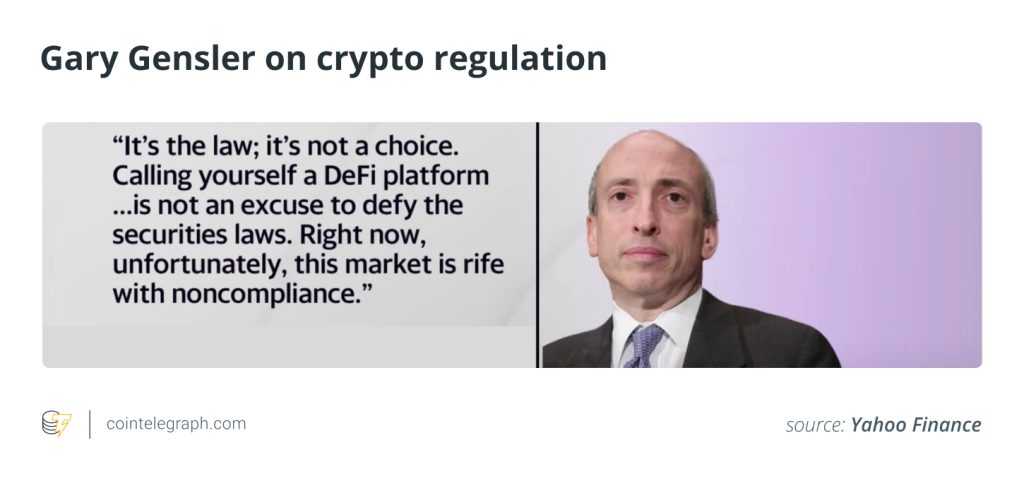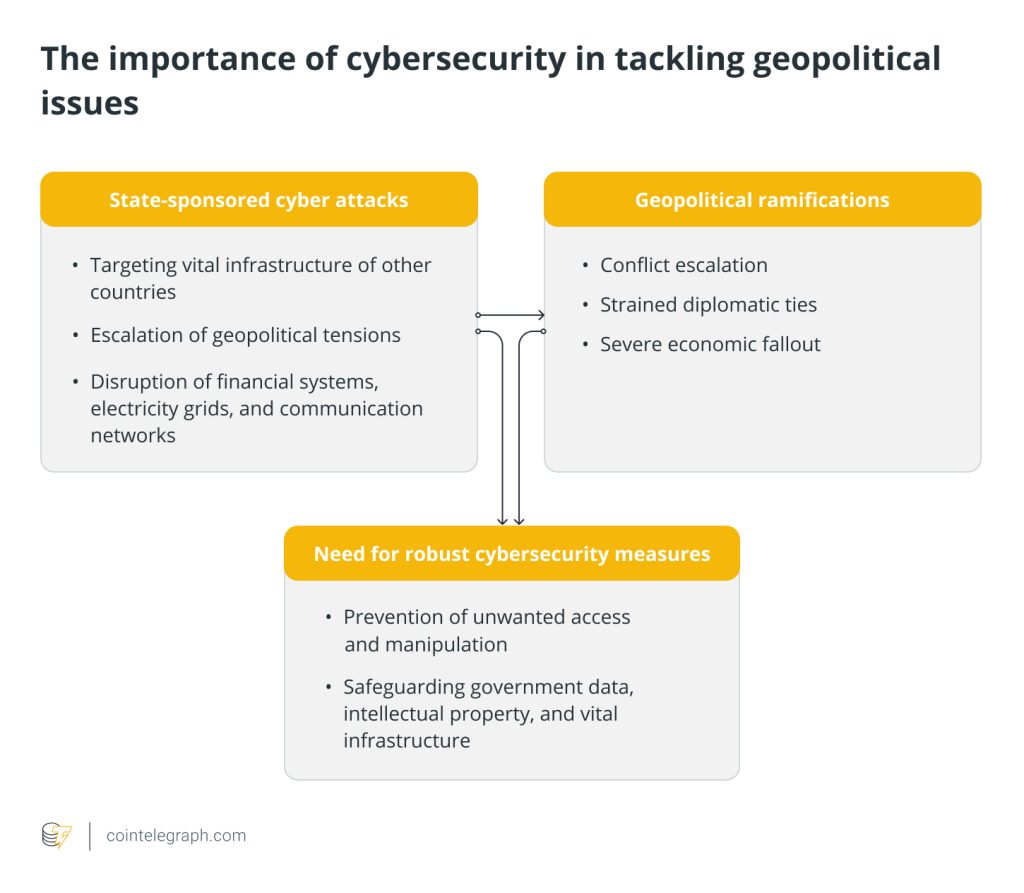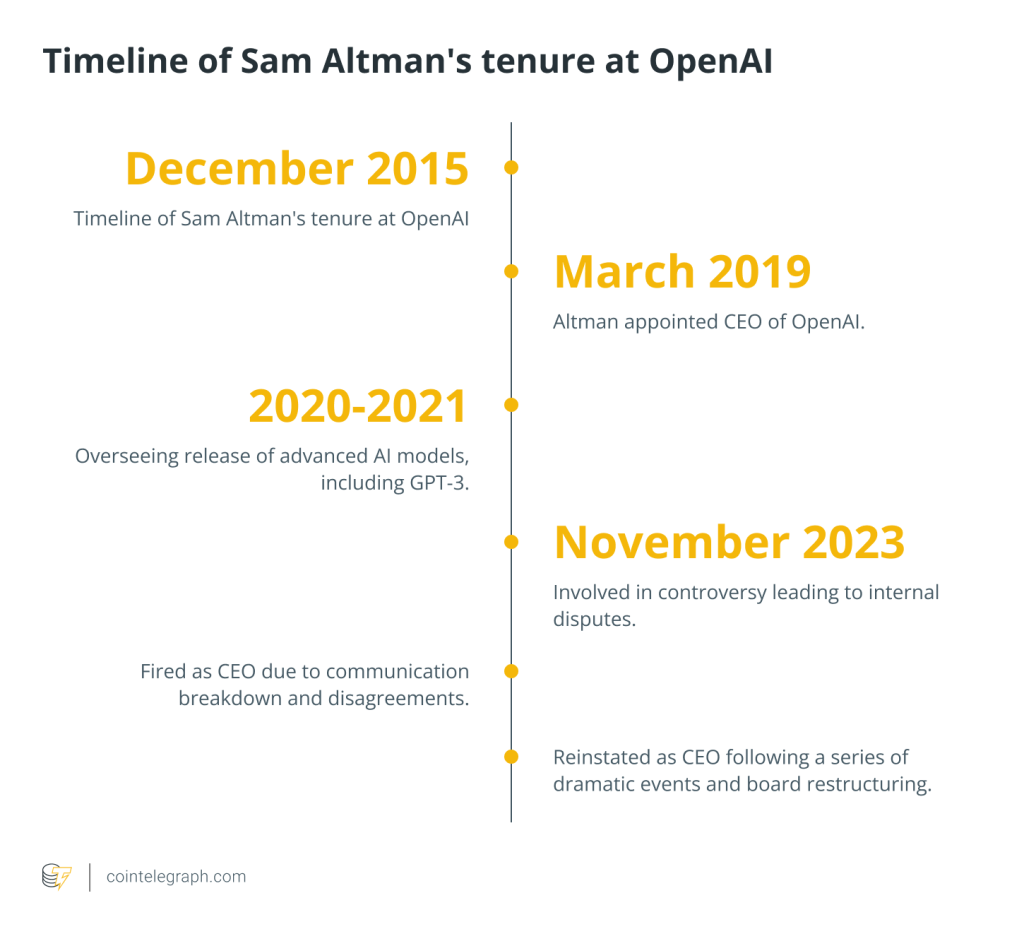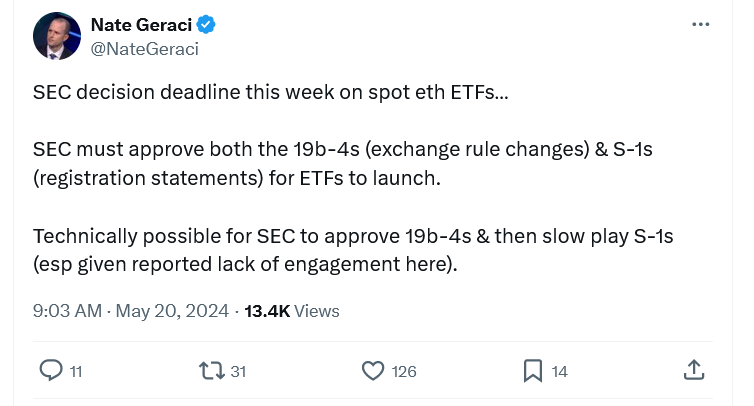Who is Gary Gensler, and what is his role in regulating crypto?


In the financial world, Gary Gensler is recognized as an astute regulator with a deep understanding of the complex machinery that powers global finance. Gary Gensler, born on Oct. 18, 1957, hails from Baltimore in the United States state of Maryland.
His academic and professional background is robust and impressive, serving as the foundation of his authority in the finance world. Gary Gensler earned a bachelor’s degree in economics and a master’s in business administration from the Wharton School at the University of Pennsylvania.
Gensler began his career at Goldman Sachs, where he worked for 18 years in its mergers and acquisitions department, eventually becoming the co-head of finance. Following his tenure at Goldman Sachs, Gensler transitioned to the public sector, holding key positions in the U.S. Treasury Department under President Bill Clinton and heading the Commodity Futures Trading Commission (CFTC) under President Barack Obama.
As the Securities and Exchange Commission (SEC) chair, Gensler brings a comprehensive understanding of finance, economics and digital technology. His appointment signaled the administration’s intent to bring clearer regulation to the rapidly evolving world of cryptocurrencies. Gensler is tasked with enforcing securities laws to ensure fair and efficient markets, responsibilities that have extended to cryptocurrencies with their rise in popularity and market capitalization.
Under Gensler’s leadership, the SEC has sought to strike a balance between fostering technological innovation and protecting investors. While he recognizes the transformative potential of cryptocurrencies, Gensler is also keenly aware of the risks associated with digital assets, particularly regarding investor protection and market integrity. With his deep understanding of the technology and commitment to protecting investors, Gensler’s role in shaping the regulatory landscape for cryptocurrencies is of paramount importance.
Gensler’s career prior to crypto regulation
Gensler’s career before his role in cryptocurrency regulation paints a picture of an individual deeply rooted in the world of finance and policy-making. His tenure at Goldman Sachs spanned nearly two decades, during which he gradually climbed the ranks to become a partner and co-head of finance. Here, Gensler developed a comprehensive understanding of financial markets and Wall Street operations. The skills and insights he garnered during his time in the private sector provided a strong foundation for his subsequent roles in public service.
Transitioning into the public sector, Gensler served in the Treasury Department under the administration of President Bill Clinton. He worked on various aspects of economic policy, further sharpening his understanding of the interplay between financial markets and government regulation. His commitment to public service was exemplified in his ability to tackle complex economic issues, contributing significantly to the financial reform agenda of that era.
Gensler’s public service career was further elevated when he was appointed chairman of the Commodity Futures Trading Commission under President Barack Obama. In this capacity, he played an instrumental role in implementing the Dodd-Frank Act, legislation enacted in response to the 2008 financial crisis aimed at reducing risks in the U.S. financial system.
Through this role, Gensler demonstrated his dedication to creating robust regulatory frameworks to protect consumers and maintain the integrity of financial markets. His experience at the CFTC provided him with invaluable insights that he now brings to the forefront of cryptocurrency regulation as the SEC chair.
Appointment as SEC chair
Gensler’s appointment as SEC chair in 2021 marked a significant moment for the intersection of finance and technology in the United States. President Biden’s decision to appoint Gensler, a seasoned expert in finance with a strong understanding of digital technologies, was met with widespread approval.
It signaled a clear intent by the administration to navigate the complex dynamics of financial innovation, particularly concerning the emerging cryptocurrency sector. The appointment suggested that while these technologies would be embraced for their potential to revolutionize the finance industry, they would also be subject to careful regulation to protect investors.
Indeed, Gensler’s reputation as a rigorous regulator, honed during his tenure at the CFTC, precedes him. His work implementing key aspects of the Dodd-Frank Act after the 2008 financial crisis demonstrated his commitment to robust financial oversight and investor protection. This reputation stoked anticipation within both traditional finance circles and the rapidly evolving cryptocurrency industry, creating expectations that Gensler would bring the same level of meticulous oversight to the burgeoning cryptosphere.
These high expectations underscore the significance of Gensler’s role as SEC chair and highlight the critical juncture at which the financial industry stands. With digital assets gaining prominence, ensuring investor protection, market integrity, and regulatory compliance becomes more complex and pivotal. As Gensler stepped into his role as SEC chair, the financial community watched with keen interest, confident in his ability to steer the industry through this digital transformation era.
Gensler’s approach to regulating cryptocurrency
The SEC’s stepping into cryptocurrency regulation aligns with its mission to safeguard investors, maintain orderly and equitable markets, and facilitate capital formation. With digital assets like cryptocurrencies evolving and gaining prominence, they’ve become a significant part of the broader financial ecosystem.
This integration has sparked a need for transparency, accountability and investor protection, necessitating the SEC’s active involvement in the realm of digital finance. Under Gensler’s leadership, the SEC has amplified its efforts to ensure that the operations within the cryptocurrency market adhere to these essential principles.
He has expressed a strong belief in the revolutionary potential of cryptocurrencies and blockchain technology to redefine various facets of the finance sector. However, he believes that the evolution must not compromise investor security or overall market integrity.
Consequently, he has been a strong proponent of establishing clear and thorough regulatory frameworks for cryptocurrencies, asserting that such regulations are critical for the industry’s sustained growth and stability.
Gensler’s views on Bitcoin and other cryptocurrencies
Gensler’s opinions on Bitcoin (BTC) and Ether (ETH) — the two leading cryptocurrencies — have been widely reported. He recognizes Bitcoin’s role as a “store of value,” drawing parallels with gold.
Ethereum, with its revolutionary smart contract functionality forming the backbone of the growing decentralized finance (DeFi) sector, has also earned Gensler’s acknowledgment. Nevertheless, he is steadfast in his stance that Bitcoin, Ether, and all other cryptocurrencies must function within a regulatory environment designed to protect consumers and deter illicit activities.
Gensler’s particular concern lies with tokens that might fall under the classification of securities as per U.S. law. He emphasizes the importance of clarity in defining these assets, aiming to prevent market manipulation and ensure investors have access to comprehensive information.

Why does Gensler matter in the world of crypto?
Gensler’s role in the world of cryptocurrencies is significant for several reasons: First, as the SEC chair, he holds a pivotal role in the U.S. regulatory landscape. Given the growing influence of cryptocurrencies and digital assets on the broader financial markets, his actions and directives have far-reaching implications.
Under Gensler’s leadership, regulatory clarity from the SEC can significantly impact the pace and direction of innovation within the cryptocurrency industry, affecting many stakeholders, from individual investors to large institutions.
Secondly, Gensler’s extensive experience in traditional finance, combined with his deep understanding of blockchain technology, positions him to bridge the gap between these two worlds. While he is a strong proponent of regulation, his recognition of the potential benefits of cryptocurrencies and blockchain technology sets a tone of cautious optimism.
However, the recent lawsuits against major cryptocurrency exchanges, such as Binance and Coinbase, provide a glimpse into Gensler’s regulatory priorities, suggesting that he aims to increase oversight and accountability in the crypto industry.
The future of cryptocurrency regulation under Gensler’s leadership
The future of cryptocurrency regulation under Gensler’s leadership aims to balance innovation and investor protection. As a renowned expert in financial markets and digital technology, he has demonstrated his commitment to understanding the intricacies of the rapidly changing digital asset landscape, aiming to formulate regulations supporting technological advancements while safeguarding market integrity.
Gensler’s track record as a stringent regulator suggests that the “wild west” era in the cryptocurrency market may be drawing to a close. The priority for Gensler and the SEC is to establish clear, comprehensive rules that protect investors, prevent market manipulation, and promote market transparency.
The focus extends to all forms of digital assets, including those that might be classified as securities under U.S. law. The push for regulatory clarity is expected to provide a more solid foundation for the growth and mainstream adoption of cryptocurrencies.
Gensler’s approach pushes toward a more centralized regulatory framework, which contradicts the key concepts of DeFi. This divergence between DeFi’s attitude toward decentralization and Gensler’s regulatory approach has raised discussions regarding the interoperability of decentralized technology with existing regulatory frameworks. Critics believe that strict laws may discourage innovation, limit the potential of DeFi projects, and hinder the democratization of financial services.
Related: SEC charges against Binance and Coinbase are terrible for DeFi
As the crypto industry continues to advance, it remains to be seen how Gensler’s regulatory focus will affect the development and adoption of decentralized finance. Balancing the need for regulatory oversight with the decentralized nature of DeFi presents a problem that regulators, industry participants, and DeFi projects must solve collectively to strike the appropriate balance and unlock the full potential of decentralized finance.
Written by Tayyub Yaqoob






nice
… [Trackback]
[…] Find More on that Topic: x.superex.com/academys/beginner/2746/ […]
… [Trackback]
[…] Find More here to that Topic: x.superex.com/academys/beginner/2746/ […]
… [Trackback]
[…] Read More here on that Topic: x.superex.com/academys/beginner/2746/ […]
… [Trackback]
[…] Find More on to that Topic: x.superex.com/academys/beginner/2746/ […]
… [Trackback]
[…] Find More Information here on that Topic: x.superex.com/academys/beginner/2746/ […]
… [Trackback]
[…] Read More here on that Topic: x.superex.com/academys/beginner/2746/ […]
… [Trackback]
[…] Read More here to that Topic: x.superex.com/academys/beginner/2746/ […]
… [Trackback]
[…] There you can find 13593 additional Information on that Topic: x.superex.com/academys/beginner/2746/ […]
… [Trackback]
[…] Here you can find 55726 additional Info to that Topic: x.superex.com/academys/beginner/2746/ […]
… [Trackback]
[…] Read More Info here to that Topic: x.superex.com/academys/beginner/2746/ […]
… [Trackback]
[…] Read More Info here to that Topic: x.superex.com/academys/beginner/2746/ […]
… [Trackback]
[…] Read More on on that Topic: x.superex.com/academys/beginner/2746/ […]
… [Trackback]
[…] Here you can find 28444 additional Information on that Topic: x.superex.com/academys/beginner/2746/ […]
… [Trackback]
[…] Find More here on that Topic: x.superex.com/academys/beginner/2746/ […]
… [Trackback]
[…] Find More Info here to that Topic: x.superex.com/academys/beginner/2746/ […]
… [Trackback]
[…] Find More here to that Topic: x.superex.com/academys/beginner/2746/ […]
… [Trackback]
[…] Read More on that Topic: x.superex.com/academys/beginner/2746/ […]
… [Trackback]
[…] Info on that Topic: x.superex.com/academys/beginner/2746/ […]
… [Trackback]
[…] Find More Information here on that Topic: x.superex.com/academys/beginner/2746/ […]
… [Trackback]
[…] Find More Info here to that Topic: x.superex.com/academys/beginner/2746/ […]
… [Trackback]
[…] Find More here on that Topic: x.superex.com/academys/beginner/2746/ […]
… [Trackback]
[…] Find More Information here on that Topic: x.superex.com/academys/beginner/2746/ […]
… [Trackback]
[…] There you can find 27246 more Information on that Topic: x.superex.com/academys/beginner/2746/ […]
… [Trackback]
[…] Read More Information here to that Topic: x.superex.com/academys/beginner/2746/ […]
… [Trackback]
[…] Find More on that Topic: x.superex.com/academys/beginner/2746/ […]
… [Trackback]
[…] Info on that Topic: x.superex.com/academys/beginner/2746/ […]
… [Trackback]
[…] Here you can find 19502 more Information on that Topic: x.superex.com/academys/beginner/2746/ […]
… [Trackback]
[…] Find More Information here on that Topic: x.superex.com/academys/beginner/2746/ […]
… [Trackback]
[…] Find More on on that Topic: x.superex.com/academys/beginner/2746/ […]
… [Trackback]
[…] Read More Information here to that Topic: x.superex.com/academys/beginner/2746/ […]
… [Trackback]
[…] Here you will find 23077 more Info on that Topic: x.superex.com/academys/beginner/2746/ […]
… [Trackback]
[…] There you will find 8074 more Information on that Topic: x.superex.com/academys/beginner/2746/ […]
… [Trackback]
[…] Find More Info here on that Topic: x.superex.com/academys/beginner/2746/ […]
… [Trackback]
[…] Find More Info here on that Topic: x.superex.com/academys/beginner/2746/ […]
… [Trackback]
[…] Read More on that Topic: x.superex.com/academys/beginner/2746/ […]